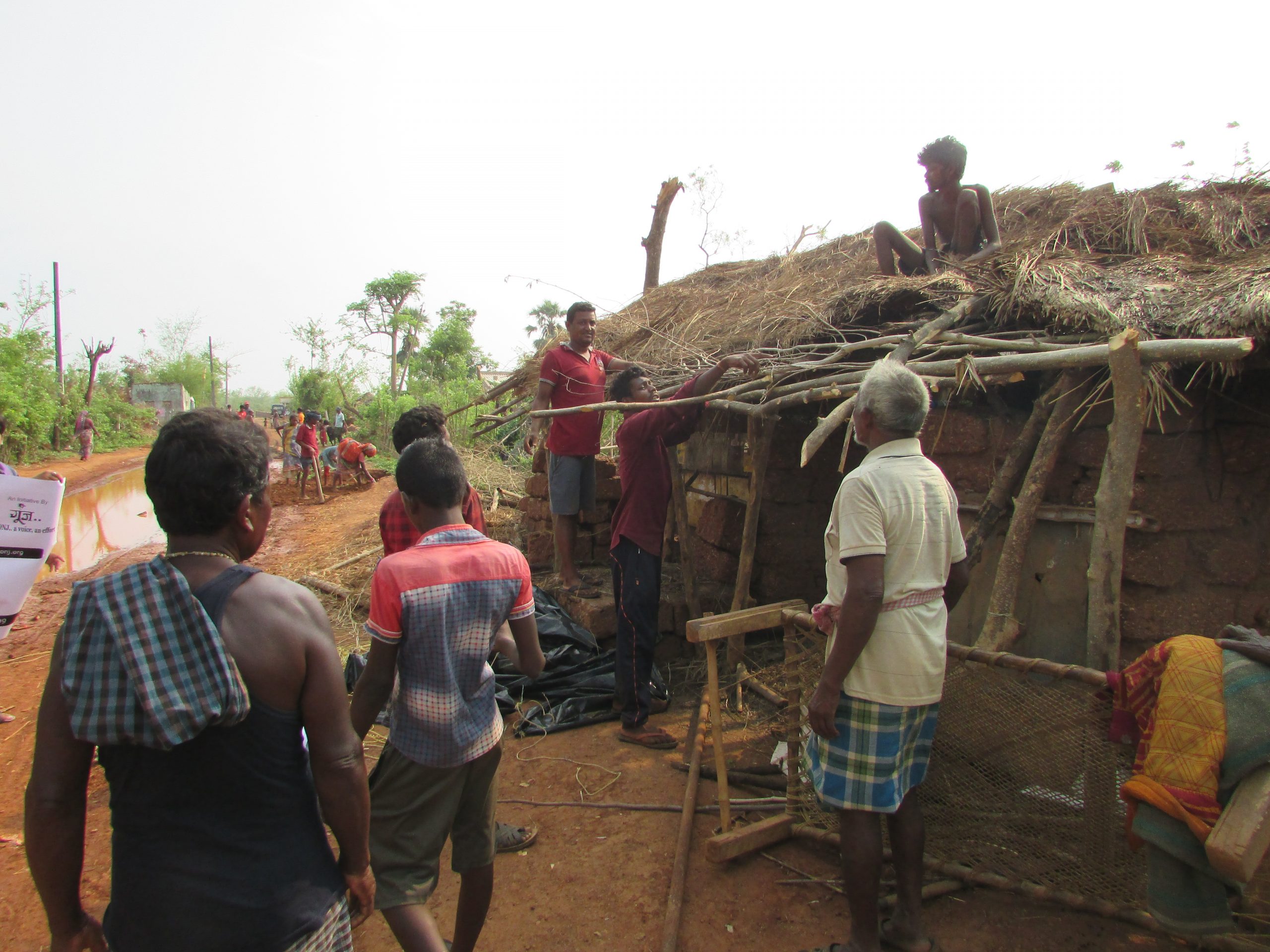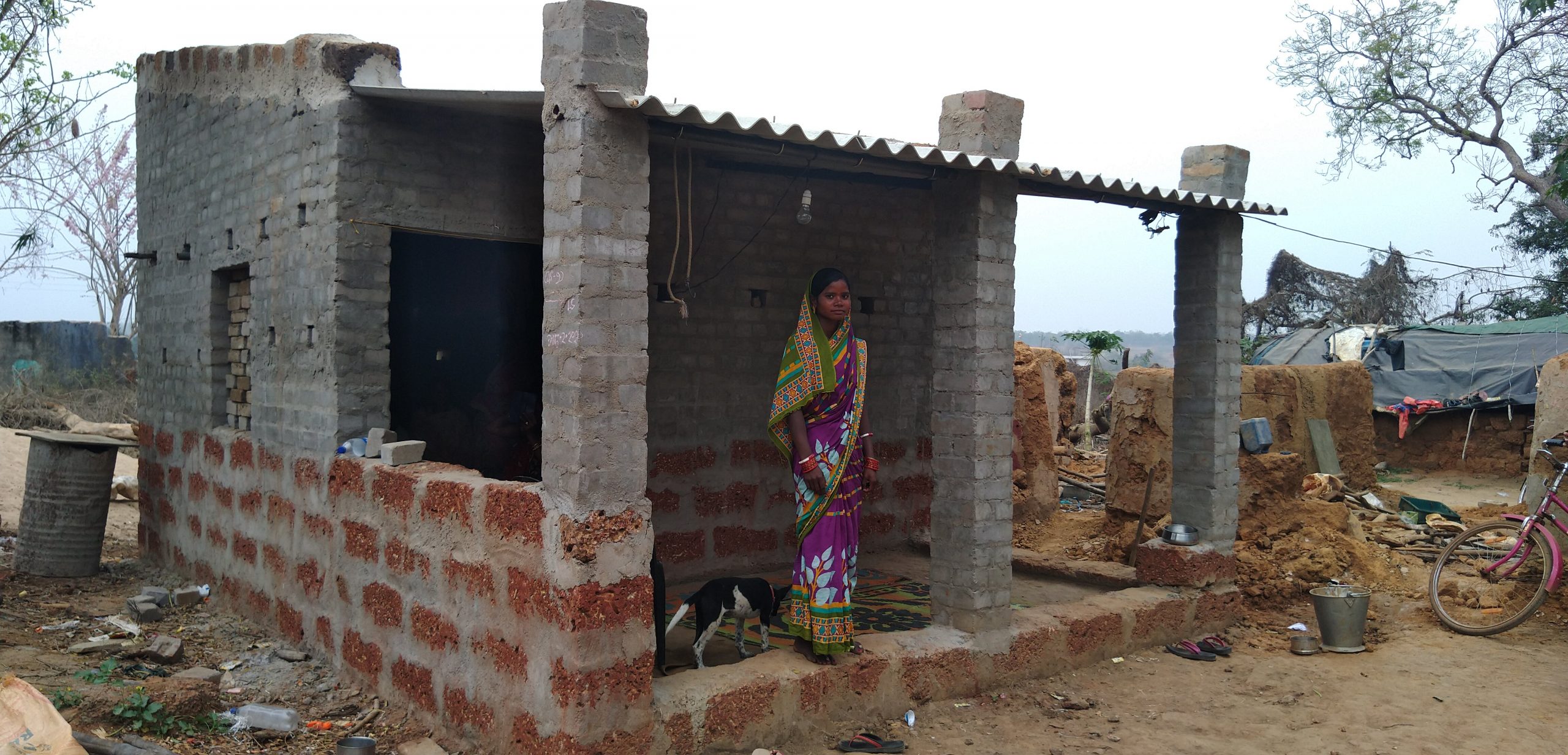Masonry training for livelihoods and disaster rehabilitation
StoryBy Rahul Thekdi, Chandrika Pattnaik
22 June 2020
Cyclone Fani destroyed the homes and livelihoods of people of Krushnanagar, a small 56-household Adivasi village in the outskirts of Bhubaneswar. PriceWaterhouseCoopers India Foundation supported a masonry training program for the community that has helped women and men find sustainable livelihood opportunities post-disaster.

The villagers helping repair houses damaged by Cyclone Fani.
Photograph by Santosh Rout
With winds roaring at more than 200 km per hour, a severe cyclonic storm Fani made landfall on the coast of Puri in Odisha on 3 May 2019. Krushnanagar Ambapadia was one of the many villages wrecked by Fani with homes and livelihoods demolished in the wake of its impact. Home to fifty-six families, this hamlet in the Khordha district is located on the periphery of Bhubaneswar city. Most of its inhabitants are from the Scheduled Tribe communities and work as daily-wage labourers, while some tend to small plots of land for subsistence farming. Cyclone Fani left the villagers of Krushnanagar high and dry with roofless homes and disruption in livelihood activities. Gram Vikas acted with alacrity and within ten days of the disaster, reached Krushnanagar with relief materials and tents for temporary accommodation.
In August 2019, Gram Vikas initiated a Mason Training programme with support from PricewaterhouseCoopers India. Mason training for affected communities has long been a post-disaster rehabilitation programme component from Gram Vikas. This not only ensures community ownership over reconstruction but also teaches a new livelihood skill that the community members can continue to use for life.
In Krushnanagar Ambapadia, Gram Vikas identified the participants for this programme through discussions in community meetings. The unemployed youths over eighteen years of age were also encouraged to join the training programme. Out of the twenty-eight people who enrolled in the training, sixteen were women. The new trainees underwent an orientation to learn about the guidelines, duration, stipend and other aspects relating to the training.

Pramila Singh learned masonry through the Gram Vikas training and used it to build her new house. Photograph by Chandrika Patnaik
Pramila Singh was one of the first women who came forward to get trained. Her husband supported and encouraged her to learn masonry skills, which are typically perceived as a man’s domain in the construction sector. Pramila’s decision was significant as women working in the construction sector are often relegated to being ‘labourers’ or ‘helpers’. She attended the sixty days of intensive training conducted by experienced master masons in Gram Vikas. The training covered a range of professional masonry work, such as site clearing, earthwork and excavation, rubble and brickwork, plastering, flooring, reinforcement work, concrete work etc.
Pramila credits the Gram Vikas training programme for instilling in her the confidence to earn by working as a skilled mason. As Pramila’s husband worked as a daily labourer in farms or vegetable markets, it was always a hand to mouth existence for the family. Masonry skills gave Pramila a new dignified livelihood option with better incomes.
Before Cyclone Fani hit her village, Pramila used to live in a mud house made with a thatched roof. Cyclone Fani tore through their home and blew away the thatched roof. In the aftermath of Fani, Pramila and her family lived in a makeshift shelter roofed with a plastic sheet.
In October 2019, Pramila decided to build a new house for her family. With some savings, help from her husband and using her masonry skills, Pramila built the house in just two weeks. It’s now a place where her family can pick up the pieces of a life shattered by the cyclone. Whenever a visitor comes, Pramila takes great pride in giving a tour of the house, which she built with her hands and from the scratch. Other women from Pramila’s village are proud of the way Pramila achieved a dignified life for the family. In the future, Pramila wants to find work as a mason in other villages.
Mason training participants in Krushnanagar Ambapadia village.
Photograph by Artatrana Sunani
ACKNOWLEDGEMENT
Aswini Behera, Junior Manager with Gram Vikas, helped in data collection.
ABOUT THE AUTHOR
Rahul Thekdi is a communication intern and Chandrika Pattnaik is a Junior Manager at Gram Vikas.
RELATED BLOGPOSTS
Turning losses into gains: How Mallipanka farmers find success in new crops
Reviving agriculture: Mallipanka’s first strawberry farm story.
Ensuring dignity beyond life: supporting migrant families in their darkest hours
Gram Vikas ensures safe migration and dignified repatriation for deceased migrant workers, supporting bereaved families.
Collective leadership transforms ageing overhead water tank to secure household water supply for all
Kalakhadi’s aging overhead tank revived through collective leadership, ensuring sustainable water supply for the community.